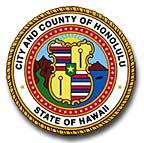Council gives transit
go-ahead 13 years
after initial rejection
Thirteen years after a similar proposal for a mass transit system died -- along with $600 million in federal funding -- U.S. Rep. Neil Abercrombie was all smiles yesterday after the City Council voted to move forward this time around.
 "I'm very happy," Abercrombie said after the Council voted 7-2 to raise the general excise tax on Oahu to 4.5 percent from 4 percent to raise hundreds of millions of dollars for a mass transit system, most likely rail.
"I'm very happy," Abercrombie said after the Council voted 7-2 to raise the general excise tax on Oahu to 4.5 percent from 4 percent to raise hundreds of millions of dollars for a mass transit system, most likely rail.
"Thirteen years we've been waiting for this day," said Abercrombie (D, Hawaii). "We'll pick up this ball, we're going to run with it and we're going to do great things for the City and County of Honolulu.
< "I'm going to be beginning my lobbying campaign with the Congress to get everybody aware of what we need to do here for transit in Honolulu and to gain their support."
In a standing-room-only conference room in Kapolei Hale, Council members heard about two hours of passionate testimony from more than 65 people both for and against the tax increase.
Supporters, some of whom lined the conference room with signs reading "I will ride" and "Now or never," applauded as the final voting results were announced.
Opponents criticized Council members for ignoring the concerns of constituents who say higher taxes will be too much for ordinary citizens to bear.
"Frankly, I feel we've been shafted," said Rayson Sakugawa, 36, a public school education assistant from Mililani. "Those of us who work paycheck to paycheck, we're getting taxed more and more every year."
Rail critic Cliff Slater of Honolulutraffic.com (formerly the Alliance for Traffic Improvement) said the Council's vote did not surprise him.
He said it is too early to say whether his group would consider a lawsuit to try and stop the tax increase.
"We'll continue to educate the public," Slater said. "This is the really early stages of the situation. A lot will depend on the honesty of the alternative analysis -- that's going to be quite critical."
An alternative analysis would study and recommend the best mass transit option for Oahu. A rail system has emerged as the most likely option.
The proposal approved by the City Council was made possible by state legislation passed this year that allows counties to tack a surcharge of half a percentage point to the excise tax to raise money for transportation projects. Only the Oahu Council has acted on the measure.
Some Republican lawmakers who criticized GOP Gov. Linda Lingle for letting the enabling legislation become law without her signature showed up yesterday to oppose the City Council's proposal.
"We can't call it an investment because investment is voluntary," said Sen. Sam Slom (R, Diamond Head-Hawaii Kai), president of Small Business Hawaii. "This is not voluntary.
"When we talk about quality of life, that's something that individuals and families and businesses should decide for themselves, not have the government -- particularly the city government with its tax record -- decide."
But supporters applauded the City Council for what they called an unpopular move that will benefit all of Oahu in the long run.
Dan Neyer, 59, a city worker from Wahiawa, said he probably would not ride a rail system, but he still supports the project.
Neyer said he fears that if traffic congestion continues, it could raise operating costs for businesses with high transportation costs, such as grocery stores that would then pass the added costs on to consumers.
"Even though I will not ride, I will benefit," Neyer said. "Am I going to get a direct benefit? No. Am I going to get an indirect benefit? Yes."
www.co.honolulu.hi.us/council/index1.htm
E-mail to City Desk
[News] [Business] [Features] [Sports] [Editorial] [Do It Electric!]
[Classified Ads] [Search] [Subscribe] [Info] [Letter to Editor]
[Feedback]
